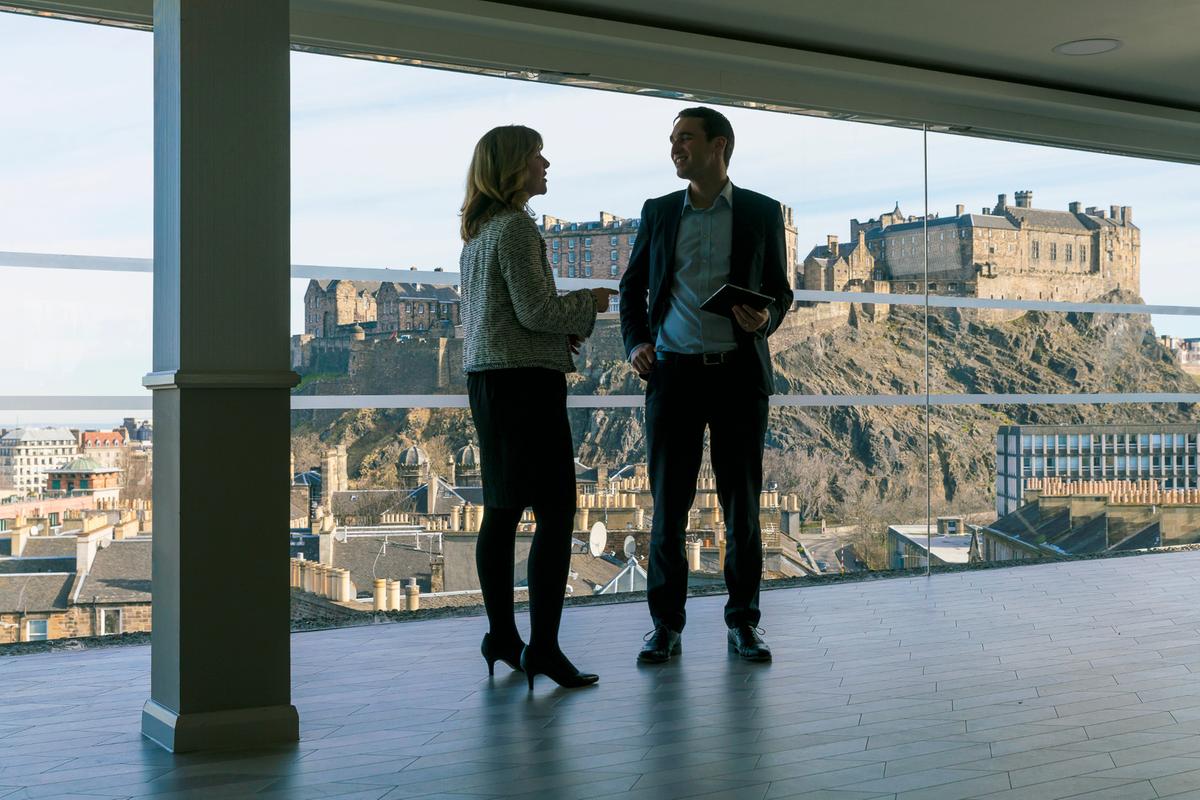
Journey to Change projection at SEC Armadillo, SEC, Glasgow
Article Published 28/10/2021
Scotland is already making great steps towards reducing its impact on the climate. Currently the country is producing the equivalent of 90% of its electricity from renewable sources, by 2030 it has pledged to generate 50% of the country's overall energy consumption from renewable sources and to almost decarbonise its entire energy system by 2050.
It is fitting therefore that Scotland will host the UN Climate Change Conference (COP26) at Glasgow's SEC, 31 October - 12 November 2021. It is the largest event to be staged in the country with more than 30,000 delegates expected over 12 days.
Rory Archibald, Associations & Sectors at VisitScotland Business Events explores the opportunities for Scotland's transformation post-COP26.
Scotland's commitment to change
In my eyes, the COP26 legacy has already started. In November 2020, VisitScotland was the first destination marketing organisation (DMO) in the world to join Tourism Declares a Climate Emergency, a voluntary initiative to align tourism and travel with the target to cut global emissions in half by 2030. Shortly after, we were followed by our partner Glasgow Convention Bureau, as the first convention bureau to join the initiative. To date there are now 12 destinations and DMOs taking part in the scheme.
In the run up to COP26, we have been closely monitoring the work of The COP26 Universities Network, a consortium of more than 80 UK-based universities and research centres which have united to raise ambition for tangible outcomes from the conference. The network's mission is to ensure that the UK academic sector plays its role in delivering a successful COP26, getting all players on track to deliver a low-carbon, resilient world. This will be done through easing access to evidence and academic expertise for government, non-governmental organisations.
It is also actively developing activities and outputs across a range of key areas, such as public engagement, adaptation, innovation, and net-zero universities. This includes climate change briefings for government and other major stakeholders, with University of Edinburgh experts having already contributed to influential briefings on 'Green Recovery' and on 'Just Transition'.
Events for change
At VisitScotland, we believe business events can be a driver for change. This is something echoed by our venues, which are making some fantastic steps to improve their sustainability credentials and initiatives.
Earlier this year, Green Tourism launched its Green Meetings Accreditation, which helps venues to prove they are taking their environmental responsibilities seriously, and Edinburgh International Conference Centre (EICC) became the first venue to gain the accreditation. The standard is overseen by independent assessors who examine criteria aligned to the United Nations Sustainability Goals, ranging from energy, water, and waste through to catering, procurement, and travel, as well as awareness, communication, and community involvement.
The EICC recently launched its new sustainability programme, Step Change, which focuses on three interconnected areas of impact: environmental, societal and economic. Under this new programme, EICC has launched three initiatives:
- Event Impact Reports every event hosted at the venue will receive a detailed and bespoke report which will describe the event's specific environmental, economic and social impacts - both positive and negative.
- Desk to Door - through this sustainable travel plan EICC shares recommendations and tips to find the most sustainable method of transport.
- Carbon Mitigation - EICC is supporting a long-term strategy to restore peatland in Caithness and Sutherland in the Scottish Highlands over the next 25 years.
Through these programmes, EICC will reassure clients that their events will demonstrate best practice in sustainability, without compromising on the event experience.
In Glasgow, the Scottish Event Campus (SEC) launched its new food strategy which includes a plan for packaging, with a commitment that all packaging used will be reusable or recyclable by 2023. The venue is also making strides in the fight against food waste and aims to have reduced kitchen wastage to under 1% of food purchases by 2025 or sooner. Food waste will continue to be diverted from landfill to anaerobic digestion processing.
Scotland is also home to one of the greenest conference centres in the UK, P&J Live. The venue has an on-site energy centre which uses food and garden waste from around Aberdeen. The waste is digested in an anaerobic plant and the resulting hydrogen gas is harvested and used to power the energy centre which supplies heating, cooling and power not only to P&J Live but also the onsite hotels.
What's to come?
Whilst we await further outcomes from COP26 itself, I believe we will see further integration of social sustainability in the wider business events community. Social sustainability identifies and manages business impacts, both positive and negative, on people and is something that has to happen in order for the climate crisis to be overcome.
At VisitScotland Business Events we will continue to work with organisations such as Keep Scotland Beautiful and Green Tourism to educate the business events community in becoming more sustainable. We will also continue to encourage our stakeholders and partners to integrate the UN Sustainability Development Goals into events as well as advocating for industry associations to show leadership in sustainability and social sustainability practises.
Now is the time for leaders to redefine business events as catalyst for social and economic transformation. We are an industry that puts people and planet first. The idea that we meet today to change tomorrow can be realised by destinations across the planet. Those events, venues and destinations that do not put people and planet first as their core strategy will fall behind and ultimately, never recover.

